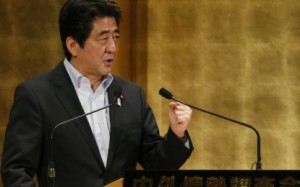
The Japanese themselves believe that the real reason for such a legislative initiative is the Japan-U.S. Security Treaty, with all the attendant consequences – is the missile and other rearmament of Japan with the participation of the United States, and closer military cooperation. The new law on state secrets should, in the opinion of the current government of Japan, lead to the full integration of the Japanese armed forces and security services in the new “turn towards Asia”, being carried out by the White House and a joint military containment of China.
It was Washington that insisted on tightening of control over information and the preservation of state secrets in Japan during the past several years – explaining this was reason for limiting contacts and exchange of information with the Japanese secret services. The Americans develop such cooperation only with the Ministry of Defense, where information exchanges are governed by the “Law on Protection of Military Secrets” of Japan. It is very significant that this law was adopted on the recommendation of the American side, at the time when Japan has begun receiving weapons from the United States, in accordance with the Japan-U.S. agreement on military assistance. Washington’s diktat is clearly evident in the fact that, in the event of an emergency, the whole territory of Japan will actually become a military base of the United States, its weapons will be placed there, and the Japanese Self-Defense Forces will come under the command of the American Army.
Shinzo Abe has repeatedly emphasized that such law is a prerequisite for the creation of the National Security Council of the American type, and it will also provide the Prime Minister with broad powers to establish a “strong armed forces”.
According to the estimates of Japanese lawyers and members of the public, the proposed bill will allow the country’s officials to declare any “sensitive” information a “state secret”, to hide it from the public eye and to punish severely any attempts to disclose it. Currently, only the Ministry of Defense of Japan may assign a special security classification for information relating to national defense. After approval of the bill by the Parliament, practically all the information can be considered a state secret by any ministry or government agency, referring to its connection with the issues of defense, diplomacy, counter-terrorism or intelligence activities.
Thus, although Japan is now carefully concealing only its defense secrets, the new law will allow the government to completely keep information secret from the public on such things as the accident at the nuclear power plant in Fukushima, and in general, all information related to the nuclear industry in Japan.
According to the new bill, published on October 25 by the Japanese magazine Asahi Shimbun Digital, public officials and other persons who have access to information classified as a state secret, can be imprisoned for a term of up to 10 years for disclosing any sensitive information. Currently, they can be imprisoned for a term of one year, with exception of the military, who can be imprisoned for a term up to five years or for a term of ten years if the information is related to the U.S. Army.
Besides this, the new bill provides that all government employees and persons having access to state secrets, along with their families and relatives, will be subject to continuous control and surveillance by the national security services. In addition to their attitude towards alcohol, mental state and financial activities, their political views will also be monitored with special care.
Japan’s Federation of Bar Associations, representatives of Japanese and foreign media, and a number of public organizations have already announced about their opposition to this bill. Not without reason, the opponents of the law believe that, following the lead of Washington, Tokyo is making ordinary citizens, and especially the media, potential targets for persecution and imprisonment, restricting and complicating the process of reporting, infringing on democracy in the country and rights to information of the public, by this law.
Vladimir Odintsov, political commentator, especially for the online magazine New Eastern Outlook.
